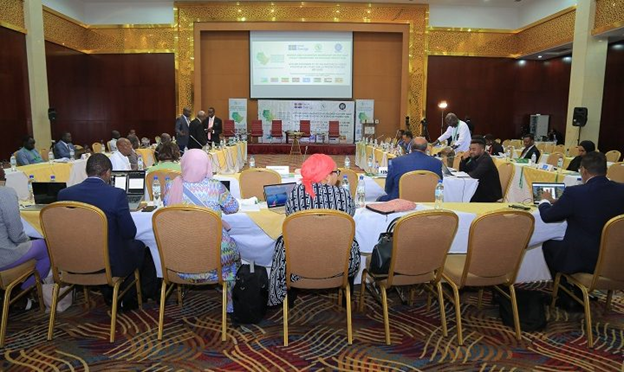
The Horn of Africa is one of the most instable part of the world where conflict, civil war and draught are frequent. For this reason, incidents of displacement and mass migration across the region are common and some countries are seen exerting their utmost effort to protect the safety of refugees. Ethiopia has an advanced regime for the protection of forced migrants and has been hosting a significant number of refugees, and the country hosts hundreds and thousands of refugees, making it one of the countries with the largest refugee populations. What is more, as part of its readiness to protect the need and interests of refugees, the government has invested in capacity building, training personnel, and establishing efficient administrative systems to effectively manage and process refugee cases.
The Ethiopian government, in collaboration with international organizations and humanitarian agencies, provides essential services to refugees, including shelter, food, healthcare, and education. As part of its commitment, Ethiopia has established a legal framework that outlines the rights and obligations of refugees, based on international and regional legal instruments such as the 1951 Refugee Convention and its 1967 Protocol. The country has also implemented standardized procedures for the reception, registration, and documentation of refugees and asylum seekers, ensuring consistency and fairness in their treatment.
IGAD Policy Framework on Refugee Protection, which is a regional mechanism developed by IGAD to address the challenges and enhance the management of refugees in the region is part of Ethiopia`s commitment towards harmonized approach to refugee management and asylum.
Lately, the Intergovernmental Authority on Development (IGAD), in partnership with Sweden government and United Nation Higher Commission for Refugee (UNHCR) has held the Regional Review and validation workshop on the draft policy framework on refugee protection, under the theme of “Towards a harmonized approach to refugee management and asylum in the IGAD region.” The Main objective of the workshop was to provide member Sates technical experts to review the updated draft, discuss its provisions, and validate the Policy framework and the Report on the Status of Refugee Management in the IGAD region.
On the workshop, experts from Sweden and UNHCR and seven IGAD member States reviewed and provided important inputs to the various provisions under the eleven priority areas in the IGAD Policy Framework on Refugee Protection and IGAD Secretariat has incorporated the agreed reviews into the draft Policy Framework. Subsequently, the updated document was presented to delegates.
Speaking on behalf of Dr. Workneh Gebeyehu, Executive Secretary of IGAD, Fathia Alwan, Director for Health and Social Development at IGAD Secretariat, highlighted the significance of the Draft IGAD Policy Framework on Refugee Protection in the IGAD region.
She expressed that IGAD’s commitment to member states goes beyond the policy development. “We strive to continue efforts to mobilize technical and financial support through the IGAD Support Platform towards a regional approach to the implementation of this policy and other forced displacement responses.”
She also further emphasized that the IGAD seeks to build on the gains of the Nairobi processes and support its Member States in harmonization of refugee protection and management policies, legislation and practices in the region for fair, predictable and gender-responsive asylum procedures through this policy framework. “Our plan is to present this Policy Framework to our Ministers in-charge of refugees for endorsement during the upcoming Nairobi Stock take meeting in November 2023 in Mogadishu.” Madam Fathia stated.
Deputy Director General, Refugees and Returnees Service (RRS), Bruhtesfa Mulugeta, on his part disclosed that the Policy Framework on Refugee Protection will augment and consolidate the achievement of the on-going IGAD-led processes by promoting comparable and predictable mechanisms for refugee management across the region, which will strengthen the sharing of experience and best practices across different contexts as well as transfer of technical capacity between IGAD Member States.
Regarding Ethiopia`s stance on the policy framework, he said, “Ethiopia believes that IGAD’s Policy Framework on Refugee Protection seeks to address multiple and interlinked concerns, manage the rising number sustainably and find durable solutions within.”
Speaking on behalf of the UNHCR Regional Bureau for the East Horn and Great Lakes of Africa, Director Mamadou Dian Balde underlined that the validation of the IGAD Policy Framework on Refugee Protection is indeed a remarkable achievement for and by the IGAD region.
“IGAD through the formulation of this comprehensive policy has taken an important step of anchoring the centrality of protection and a rights-based approach to asylum as a core part of its work.” He stated.
In addition, he described UNHCR has supported the formulation of the IGAD Policy Framework on Refugee Protection from its very inception as it has the refugee management policy of the East African Community and the elaboration of a regional solutions strategy in the Great Lakes.
Since 2017, IGAD Member States have made concerted efforts to seek sustainable solutions for displaced populations and their host communities through the Nairobi Declaration and various thematic declarations on Education, Health, Jobs, Livelihoods, and Self-reliance.
BY STAFF REPORTER
THE ETHIOPIAN HERALD SATURDAY 21 OCTOBER 2023





